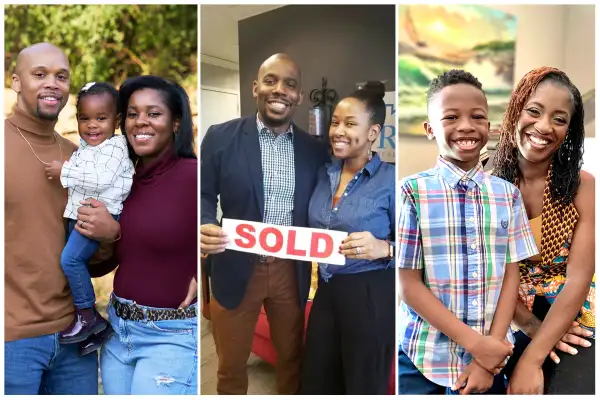Becoming a Homeowner Isn't Easy. Here's How Three Black Families Did It

When Such Charles applied for a mortgage to buy her home in 2016, her lender asked if a family member could “gift” the money for a down payment. It was not uncommon for first-time buyers to receive gifts of $50,000 or $100,000, he told her. As riots over the killing of George Floyd swept the country last month, Charles, who is Black, recalled the conversation in a tweet concluding, “That’s the 400-year head start we don’t have.”
By July, the tweet had been shared over 86,000 times. It elicited support from minority homebuyers who recounted similar experiences and pushback from some white people who said they didn’t get six-figure handouts either. For Charles, that argument misses the point. People think “if they’re not wealthy it is the same not wealthy,” she says. “It is not the same at all.”
The numbers back her up. U.S. Census Bureau data shows that the homeownership rate for Black households is 44%—30 percentage points below the 74% rate for white households. Meanwhile, the average parental wealth of white college graduates is almost 10 times greater than that of Black college graduates, according to the Housing Finance Policy Center at the Urban Institute.
The disparity in homeownership is both a symptom of the wealth gap and a factor in perpetuating it. “The majority of Americans still build wealth through their homes,” says Carolina Reid, a professor at UC Berkeley, who researches the relationship between homeownership and wealth, as well as how structural disadvantages contribute to the racial wealth gap. In the United States, more so than in many other countries, wealth creates opportunity, Reid explains. It often determines health outcomes and how people fare in college and retirement.
She adds, “If we are continually allowing the past discriminatory behavior of the government to dictate who can build wealth and who can’t, it can have a domino effect on future inequality. For example, whites who were able to buy homes after World War II—as Blacks were excluded from homeownership through redlining and racial covenants—have more wealth today, which allows them to transfer that wealth and all of the associated benefits to their kids.”
Redlining was the practice of denying mortgages in predominantly Black neighborhoods. These areas were famously outlined in red ink on maps as a warning to lenders. Racially restrictive covenants prohibited suburban homeowners from selling to Blacks. (Though, ironically, home values tended to increase when they did, since Black buyers had fewer options and therefore often paid more, notes Reid.) The Fair Housing Act of 1968 made this sort of discrimation illegal, but overt racism still occurs in the home buying process. Charles recalls friends were asked at the closing table if they had “robbed a bank” to get the downpayment for their home.
Subtler, but financially damaging, differences in service are also well documented. For instance, a 2019 investigation by Newsday found that agents working for 10 of 12 real estate brokerages on Long Island, a suburb of New York City, engaged in steering—or sorting home buyers into neighborhoods or loan types based on race or ethnicity—which is not legal.
Most of the people that Money spoke to for this story did not say they felt explicitly mistreated while shopping for a home or mortgage. Instead, they described a sense that they were playing catch-up and discomfort with not being able to judge if they were getting a fair shake. These are their stories.
Kescheler & Cameron
“Our generation was told, ‘go to school, get an education, get a good job and it should all work out,’” recalls Kescheler Powell, 34, who lives near Atlanta with her husband Cameron and their two-year-old daughter. Both have four-year college degrees and successful careers in marketing. “No one expected the 2008 recession.”
Like many Millennials, the last financial crisis bred in the Powells a wariness about money and debt. Cameron, 30, says that because he did not grow up affluent, he struggles to feel good about big purchases even when the math suggests he can afford them. “In the Black community especially people tell you to save, save, save. But in my family how to budget or manage money was not a big thing,” he says.
They decided to buy after their landlord increased the rent on their townhouse to almost $2,000 a month, and they found out they’re expecting their second child. They knew by moving 20 minutes outside the city they could get a much bigger house for a lower monthly payment and liked the idea of building equity, but were concerned about having enough money for a down payment.
So the family moved in with Kescheler’s parents for a few months and tracked their spending with a budgeting app. The coronavirus lockdown made it easy to cut back on dining out and daycare expenses but put strain on Kescheler’s business, a marketing production company she started in January.
Not wanting to take on more debt than they could handle, the Powells only used Cameron’s income to qualify for a mortgage. The Powells are days away from closing on a $297,000 ranch in Decatur, Ga. They are using their own money and a grant to put 4.5% down on an FHA loan with a 3.25% mortgage rate. In a few years they hope to refinance to a conventional 15-year mortgage so they can stop paying extra fees associated with government-backed loans and to be able to pay off the debt sooner. A shorter loan term will also mean paying less interest in the long run.
“This is not something we’ve done before and we are choosing to do it in the middle of a crisis,” says Kescheler. “You see people lose their homes in a crisis, it is very scary to be in a position in a crisis to buy a home.”
Jamar & Cherisse
Jamar and Cherisse Hudson, both 38, closed on their home in Temple Hills, Md., on March 12, one day after the World Health Organization declared coronavirus a pandemic and the NBA announced it would be ending the 2020 basketball season early. The timing—about two weeks before Maryland went into lockdown—gave the family a chance to move their belongings from the townhouse they had been renting nearby and to paint their year-old son’s new room blue.
For that, and much else, they feel lucky, says Jamar. They worked with an agent they knew from their last rental search and trusted completely. She found them a move-in-ready home that they liked quickly and the seller accepted their initial offer of $370,000. With credit scores in the mid-700s and stable jobs with government contracting companies, they had no trouble qualifying for a 30-year fixed mortgage with a 3.875% interest rate, roughly the average rate at that time, and were able to put 3% down.
Jamar’s parents helped cover some of their closing costs. Some of their down payment money was a gift from Cherisse’s mom after she sold her own home, which she bought at 27 and lived in for over 30 years.
“There is a privilege I have to wrestle with in this conversation, because a lot of the things we talk about were not my experience,” says Jamar. “Even if it doesn’t impact me directly, how do I still educate myself and be on the front lines and be aware of the issues that affect my community as a whole?”
Such
Such Charles, a singer in her 30s who performs as Such, decided to buy a Denver home in 2016, hoping to capture some of the city’s surging home values before her family would be priced out.
Finding the right place was relatively easy, but finding a lender proved difficult. Of the four Such reached out to, three turned her down off the bat, citing credit issues. Her score at the time was in the high-600s and she had a large student loan balance, as well as some credit card debt. (According to real estate brokerage Redfin, 1-in-6 Black mortgage applicants are denied mortgages, compared to 1-in-14 white applicants.)
The lender she ended up with, the one who asked if her family could give her money, advised Such to take out a home equity line of credit in addition to her first mortgage so she could avoid paying private mortgage insurance. She took a loan from her 401(k) in order to be able to put 20% down on her home, which cost between $400,000 and $500,000. Her interest rate was above 5%.
Recently, Such was able to refinance into a 30-year mortgage with a fixed rate below 4%. Over the last four years she has increased her credit score to the mid-700s, by paying off credit cards and a car loan, making progress on her college debt and increasing her income. She also paid back her 401(k). It has been a tough road, but with Denver home values up more than 25% since 2015 she doesn’t regret her choices. She just wishes it didn’t have to be so complicated.
For tips on how to save for a first home see our latest cover story: David Bach's Guide to Financial Recovery.
More from Money:
How I Saved My Small Business: A Black Wedding Planner Helps Connections Bloom in Quarantine
